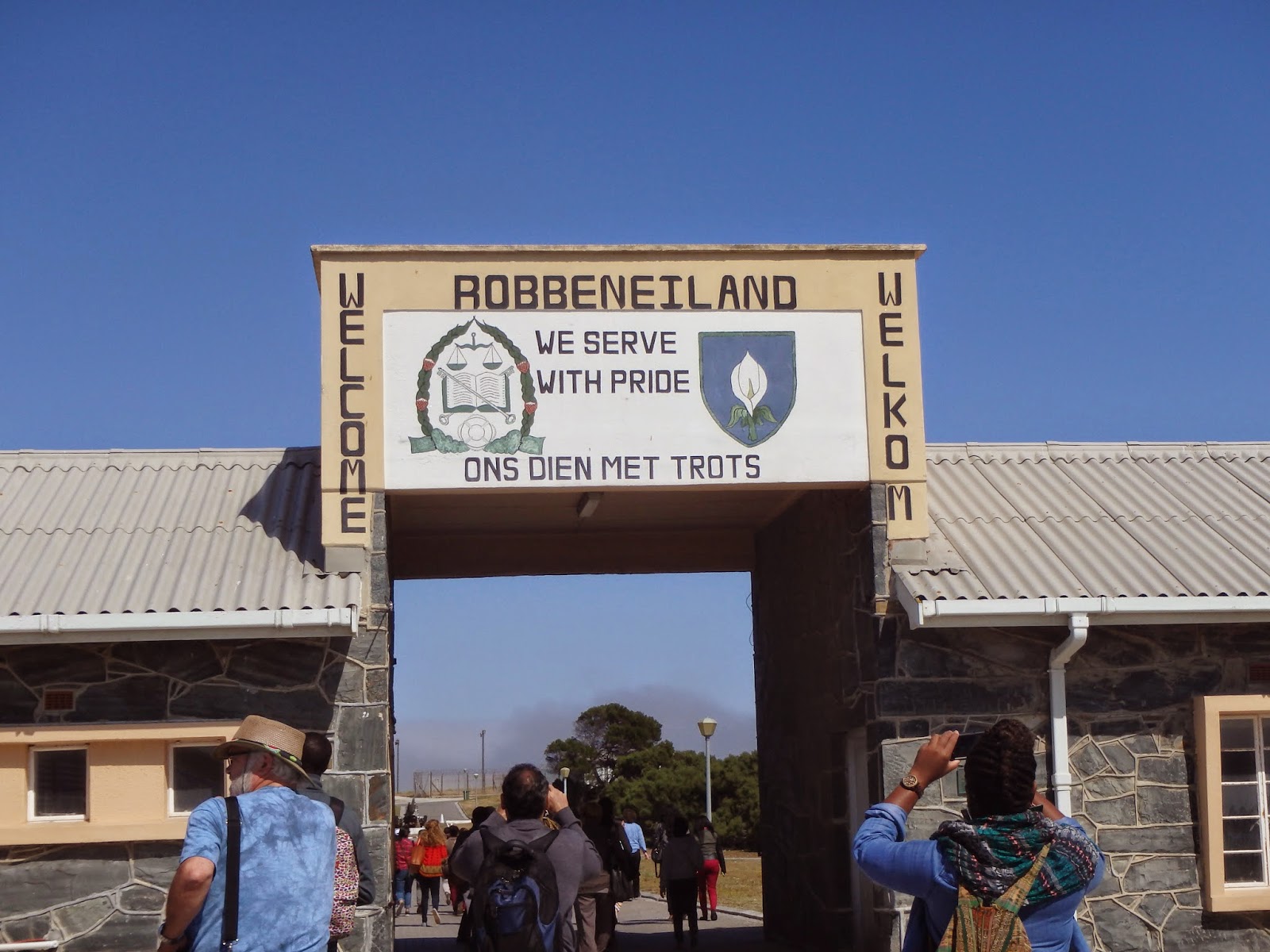As the boat pulled slowly away from the dock, one of the
museum workers shouted “See you in 27 years.” Even though he said it with a
smile and meant this playfully, these 5 words hit me hard. Twenty-seven years,
nearly ten thousand days, on an island as a consequence for having the
willingness to demand basic human rights. The weather was a perfect match to
the melancholy. The fog hung heavy, kissing the surface of the ocean as we
tugged along to Robben Island.
The maximum-security prison on the island that held hundreds
of political prisoners throughout Apartheid was our first stop. The tours were
given by actual former political prisoners who have since dedicated their lives
to telling the story of Robben Island and adding to the context of Apartheid.
Our guide was imprisoned while still a student. He spent 5 years on Robben
Island. Perhaps one of the most beautiful parts about visiting such a tragic
place was to learn that the prisoners themselves really established a vibrant
community where they worked together to survive the conditions. Of course, this
didn’t happen immediately, but overtime prisoners of all different levels had developed a tight-knit community. Prisoners took care of one
another; they went on strikes with one another, and were willing to protect one
another. There was a vividness to this dank place that existed only because of
the relentless spirits of the prisoners who never stopped fighting for justice.
As we walked through a courtyard we entered the block where
Nelson Mandela was held for 27 years. His
cell lies empty and small today, but in his time one would find it filled with
bookshelves and books that he had earned over his years. The man that would
become the President of South Africa spent nearly three decades in a cell
smaller than most bathrooms. It was a powerful experience to say the least and
our girls were incredibly respectful and reflective throughout. In fact, I
overheard a professor say how “well prepared” our students were and how
“maturely” they handled the heaviness of the day’s experiences. Together we
questioned the power of forgiveness, the strength of human resilience, and the
injustice of perceived justice.
Before leaving the island we were taken to the remains of
the Leper Colony that once existed on the island as the exile location.
Needless to say, our tour of the island kept our minds churning and our hearts
thumping as we sifted tirelessly through thoughts and feelings ignited by these
formidable experiences.
As the boat pulled back into port on the shore of Cape Town
I thought about Mandela and all the other men and women that waited so long to
have the freedom to do this. Despite this, I felt an overwhelming sense of
pride and motivation to continue doing this work.
To balance out a morning of heavy hearts, we took the
students to the waterfront. Shops lining the city streets, bands playing,
people laughing-this, they said, makes them never want to go home. From our
hotel room, we can see a giant Ferris wheel; the girls once jokingly asked if
they could go on it. Well, today we found the Ferris wheel and, of course, the
girls jumped at the opportunity. This Ferris wheel isn’t like the regular old
State Fair kind of ride, but rather an air conditioned (yes, you read that
correctly) pod that gracefully floats delicately around in a circle for 14
minutes. From the top, riders get a full 360-degree view of the city.
After they got off of the ride we walked for a bit and truly
just absorbed our surroundings. We stopped for a moment to watch a street band
play. As people gathered and began dancing strangers embraced strangers while
others cheered for their skills. The students talked extensively about ways we
make our community happier. Trying to answer the simple questions of “why isn’t
life like this back home” is deceivingly difficult.
Around 6:00 the girls attended the official conference
registration. After registration they participated in a debrief conversation
about the day’s events. Aiti stood up in front of everyone and shared her
reflection. Aiti has only been in the U.S. for three years and still struggles
with the English language, but not to my surprise, she did an excellent job and
was so very genuine in her response.
After this packed day, we were starving. On a whim we
decided to go to Marco’s Place, a traditional South African style restaurant.
They had a live band and delicious food. Needless to say we were quite
satisfied. A few days ago I challenged the girls to do at least 1 uncomfortable
thing every day. Well, tonight, they all set a new standard by trying some new
food like champions. We tried alligator, Springbok, and Ostrich. Some girls had
never eaten calamari before and tried that as well. The food was excellent, the
music was divine, and we could truly not
have been happier. The energy was electric. It was one of those memories you
want bottled up to savor it organically for the rest of time.
Tomorrow, the conference begins! Our students have been
selected to write a reflection on former President F.W. De Klerk’s speech first
thing tomorrow morning!








No comments:
Post a Comment